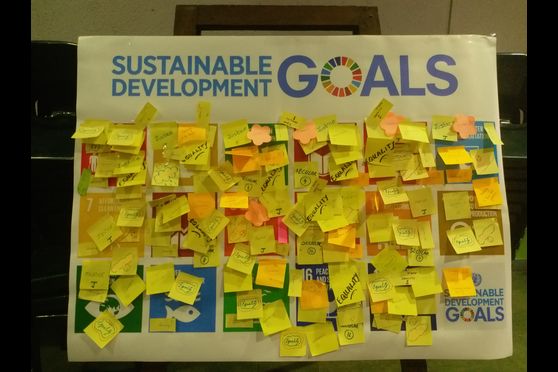School students learn about Social Justice


Schools are working to inculcate a sense of social justice in students, making them aware that every person irrespective of caste, creed, gender, class or financial background is entitled to equal social, political and economic rights and opportunities.
Apoorva Saraf, a Class XII student of St. Vincent’s High and Technical School, Asansol, recalled an incident that taught him the importance of being socially aware. “A man used to put up a food stall outside our school. Then, he suddenly started bringing his little son to help him at the stall. We were surprised to find the child working. We knew it was his age to study and not to work. It was both illegal and morally wrong. We kept telling the father every day to let his child study but he was hesitant. But in the end we managed to convince him and the boy was admitted to a school,” Apoorva said.
Apoorva is a member of the Social Justice Club at her school, where social worker and teacher Neha Pradhan Arora tells students about rights and opportunities.
Arora, who has been working in the education and development sector for over 15 years, focuses on making young people responsible leaders for their communities. She is a passionate educator, who believes that social justice must be the foundation of what we teach to ensure that the world we live in is just, equitable, inclusive and sustainable.
“The concept of social justice emphasises that everyone must have access to equal social, political and economical rights and opportunities irrespective of their caste, creed, class, gender or other factors,” Arora said.
She works with schools to embed the concept and practice of social justice in children. From initiating groups to building a just mindset, schools are slowly understanding and accepting the need to make social justice an inherent part of everything they do.
Arora is co-founder of an organisation that works on safety and protection of women and children from abuse, violence and exploitation, Arora has been working closely with the Edmund Rice Schools in India since 2018 to strengthen social justice and advocacy programmes in schools.
Thirteen schools across India are at present part of the Edmund Rice Network in India. Some schools in West Bengal involved with the network are St. Joseph’s College (Kolkata), St. Mary’s Orphanage (Kolkata), St. Vincent’s High and Technical School (Asansol), St. Patrick’s School (Asansol), and Goethals Memorial School (Kurseong).
“There is a big difference between social justice and charity. Charity involves a feeling of sympathy and superiority, whereas social justice is about empathy and understanding why poverty and depravity exist,” said Ravi Victor, the principal of St. Vincent’s High and Technical School.
Megha Dokania Baptist, teacher and one of the social justice animators at St. Vincent’s High, feels she too has benefited from the programme. “As teachers, the opportunities and exposure we get through the social justice desk in our school has made me more resourceful. Now I feel free to voice my opinion on any platform with sensitivity and respect. I am more aware of the needs of the students and the community at large,” Dokania said.
The Social Justice Club at St. Vincent’s School holds various activities such as street plays, camps, assemblies and sports events.
“Social Justice is not a standalone subject that is taught in class but it is rather incorporated into all subjects. We must teach students about justice and equality in all subjects whether science or mathematics or language or IT,” Arora said.
Aindrila Acharya, teacher at St. Joseph’s College (Kolkata), said students have participated in the initiative enthusiastically.
Preeti Chatterjee, an ex-student of St. Vincent’s School, had joined the club in Class XI. “I learnt a lot through workshops and activities that have become a part of my life now. I learned about women’s rights through workshops such as ‘Engendering Education’,” said the first-year BBA student.
Teachers who head the Social Justice programme in schools are called Social Justice Animators. The animators are trained to build perspective, skills and capacities while also learning and sharing about activities in all schools.
An Edmund Rice Justice Meet was held by St. Columba’s School, New Delhi, sometime ago to bring all schools working on social justice together to celebrate and showcase the action projects executed in schools.
“Social Justice has become a way of life for me. My family has also developed social awareness and they stand for the rights of people. The social justice club has changed the way we look at the world,” says Sujal Kedia, a Class XII student of St. Vincent’s School.
The Social Justice animators and student-leaders of the Edmund Rice Schools pledge to become advocates and work towards a world that is just, equitable and sustainable for all.